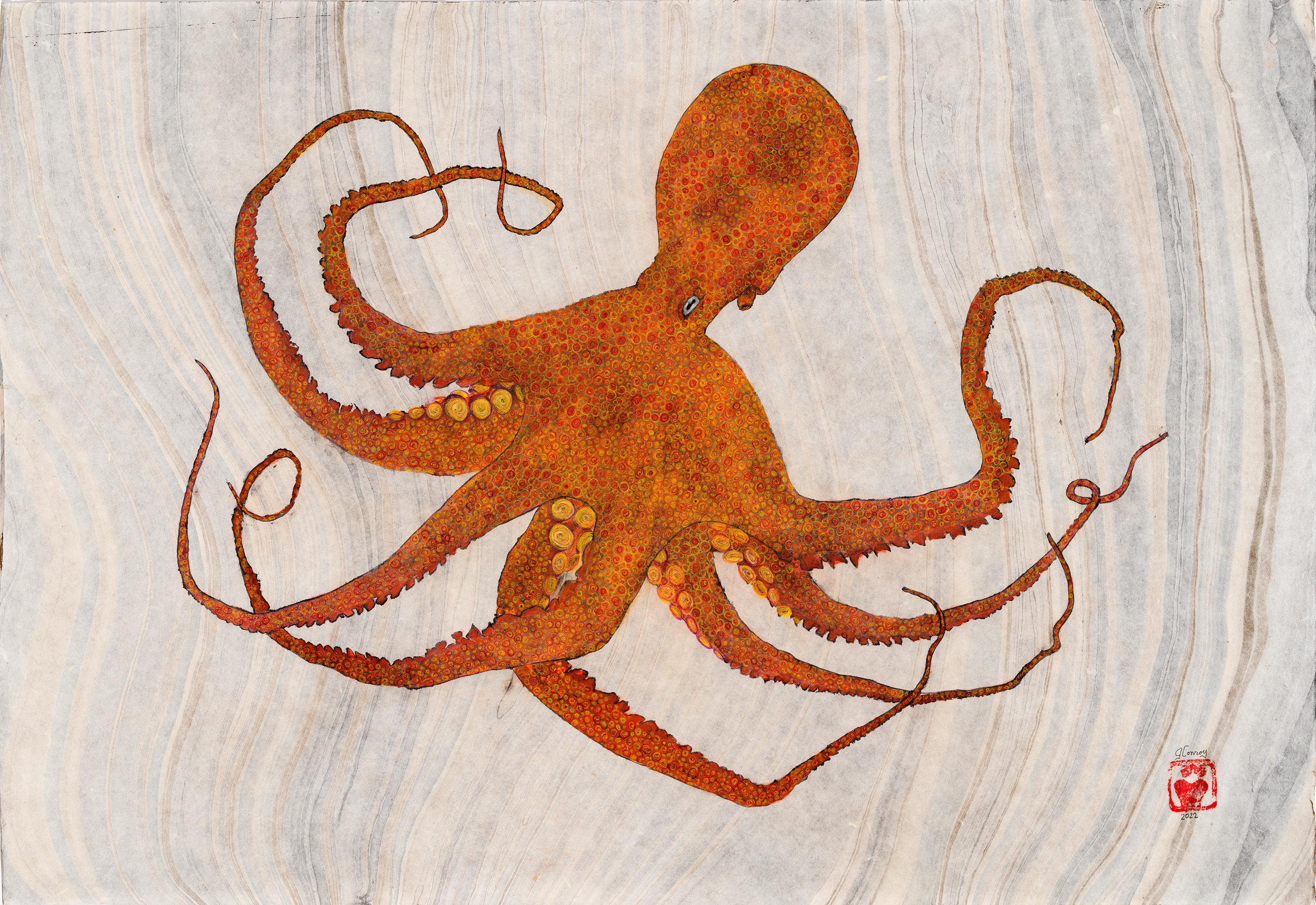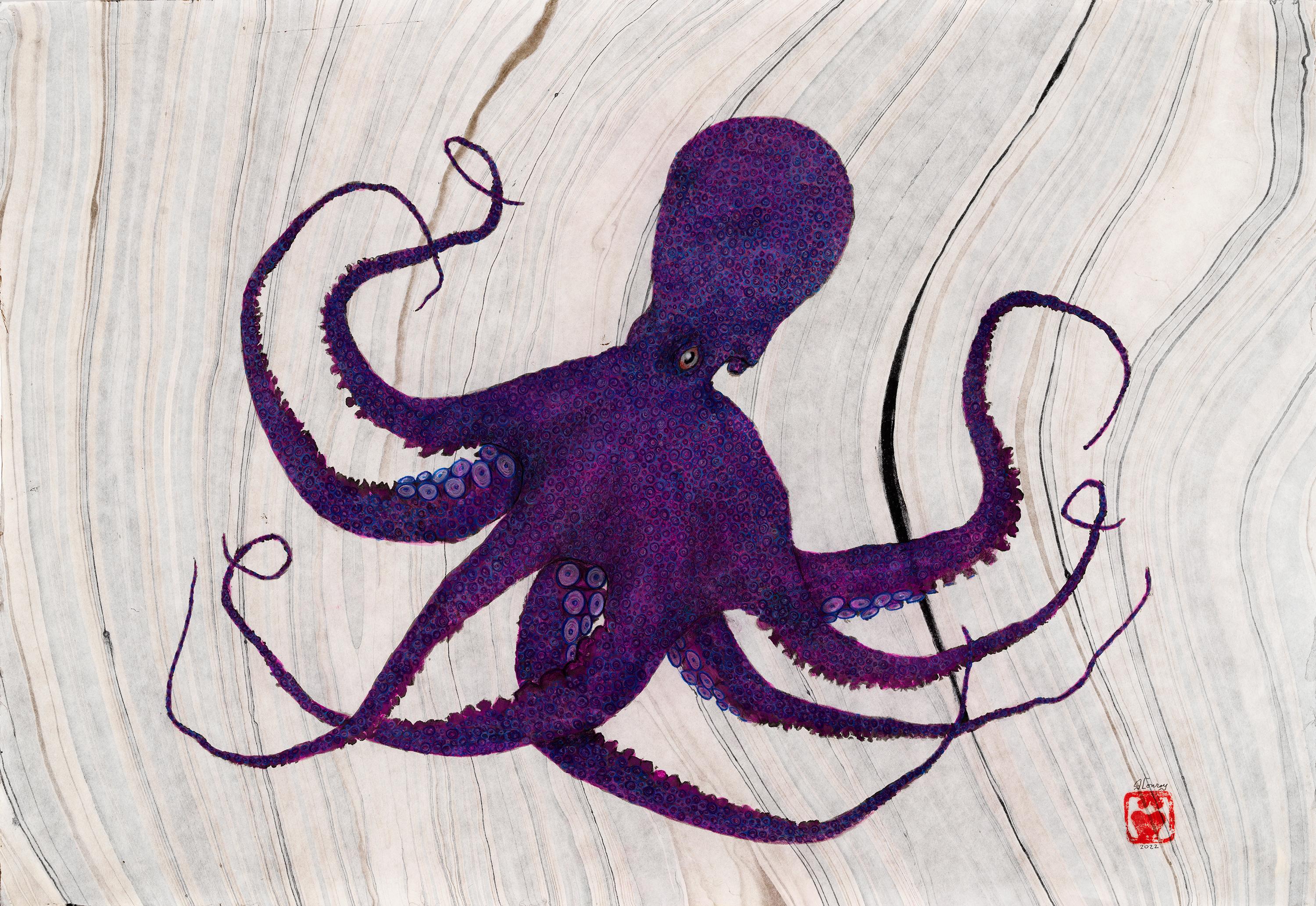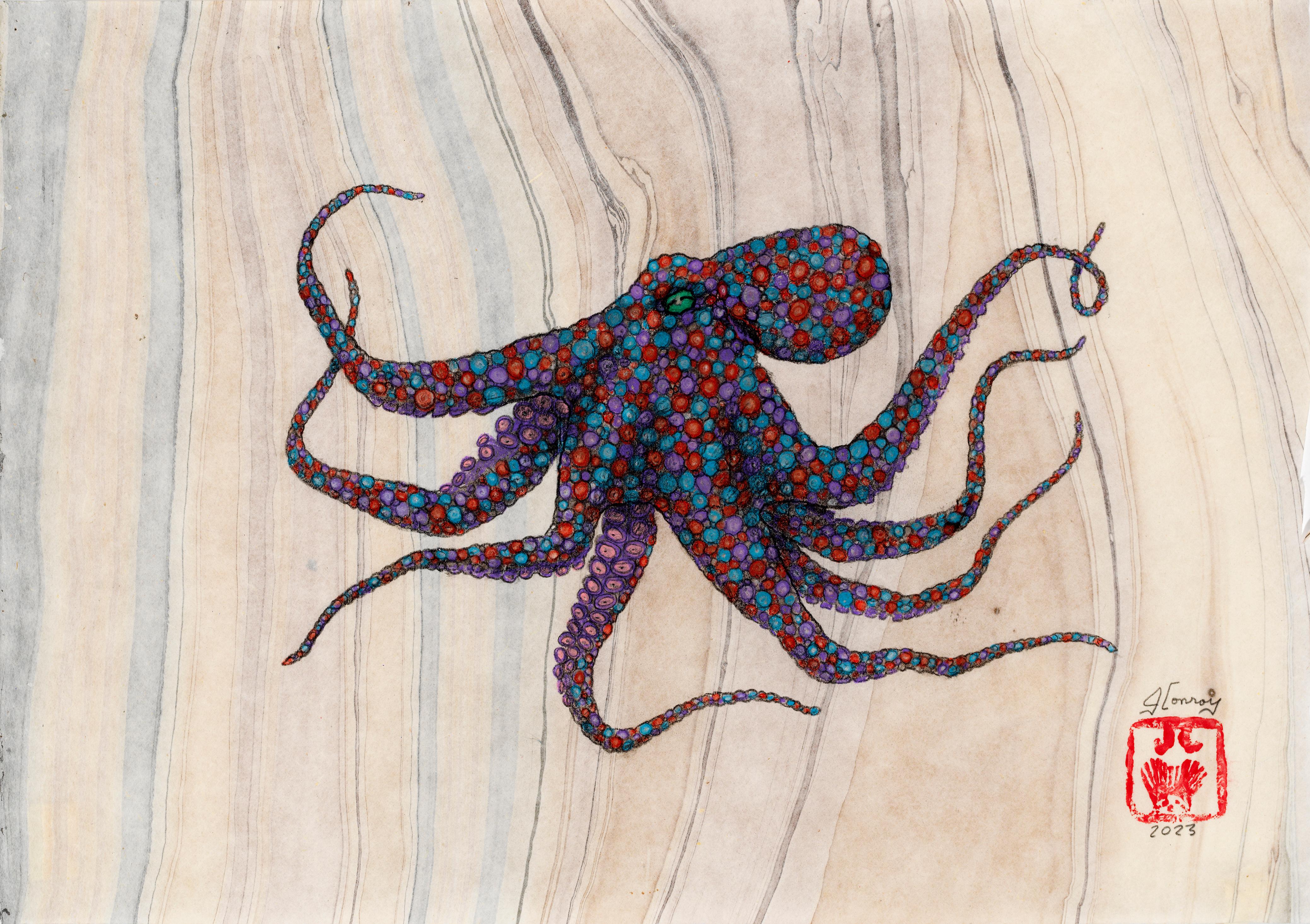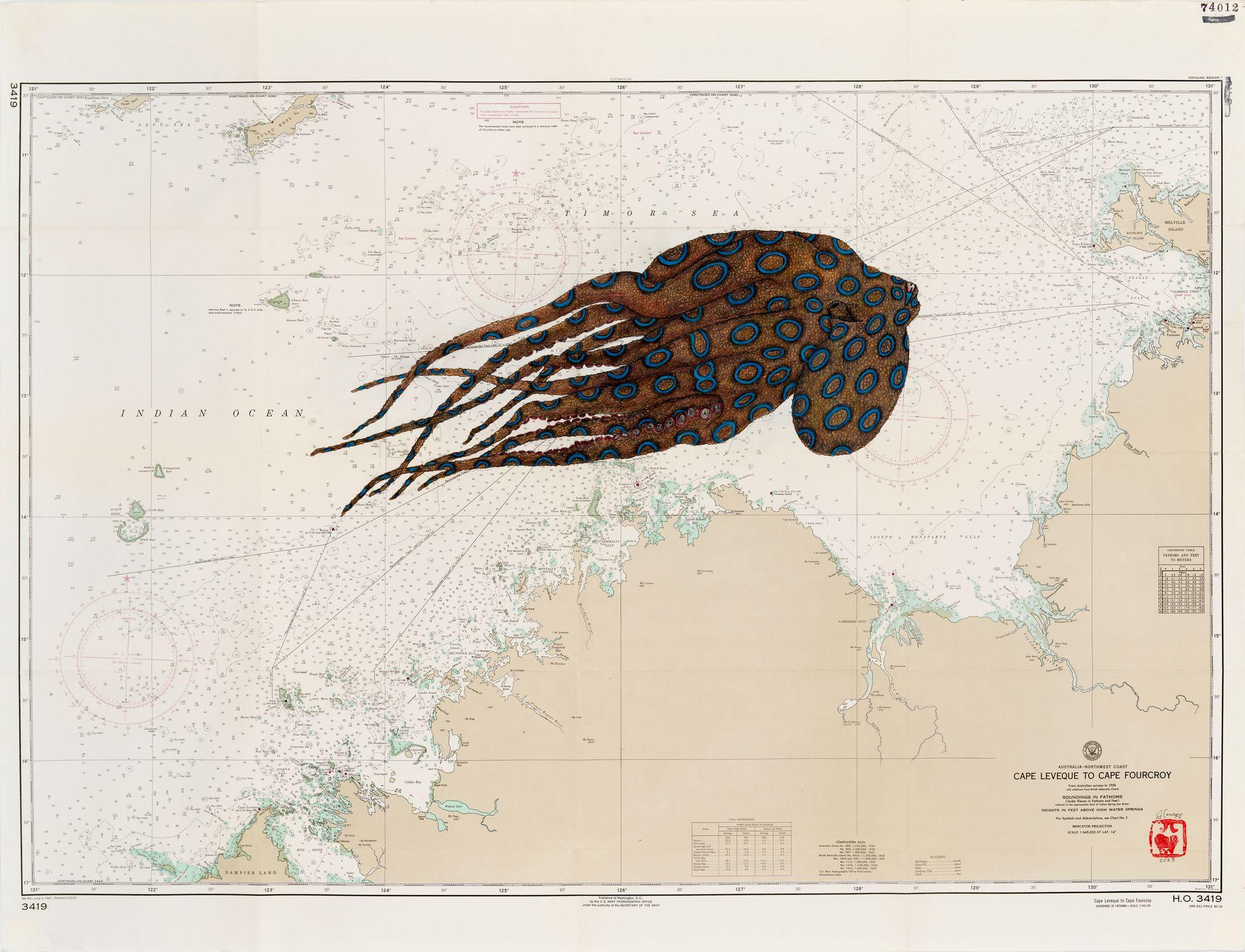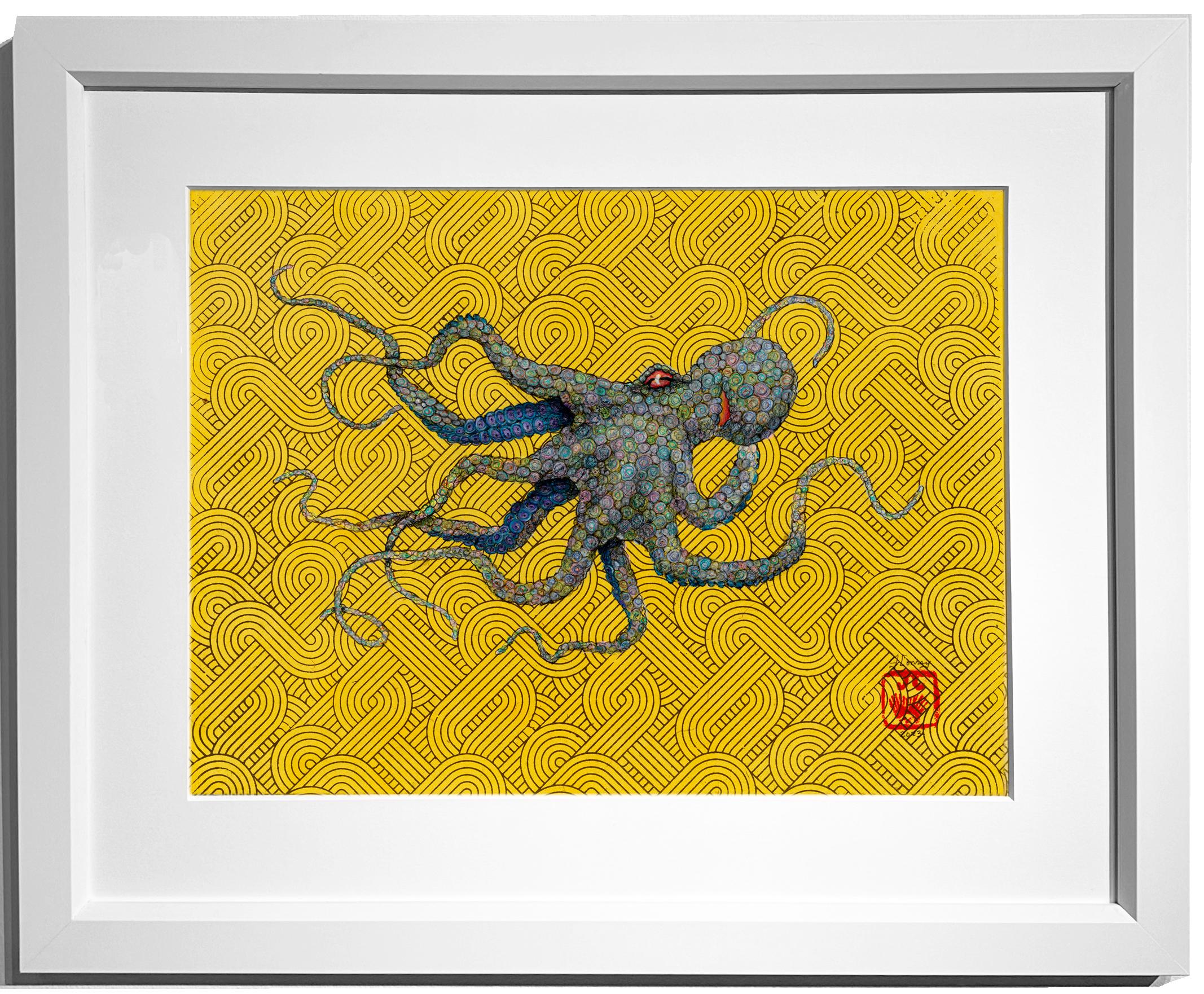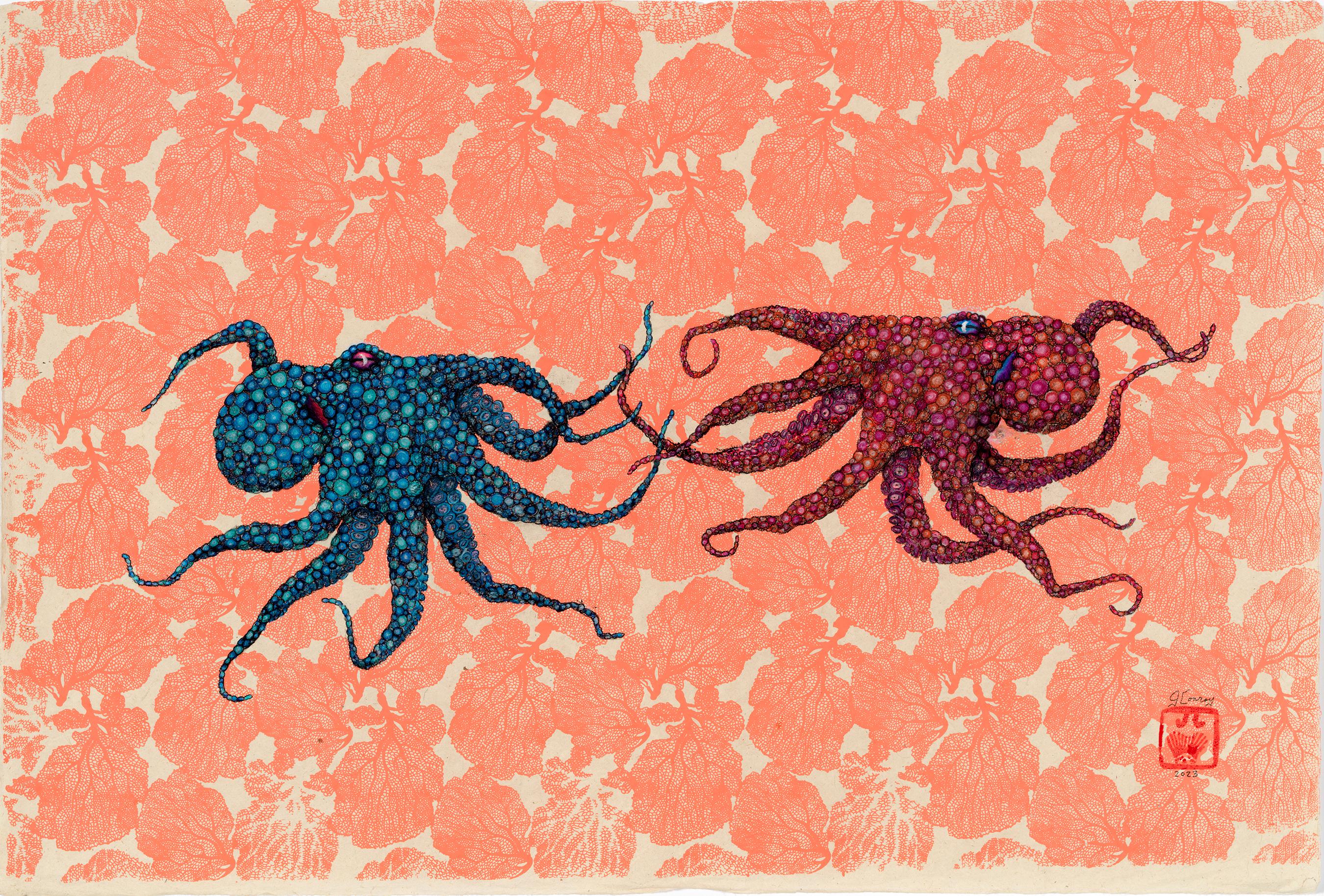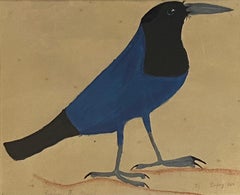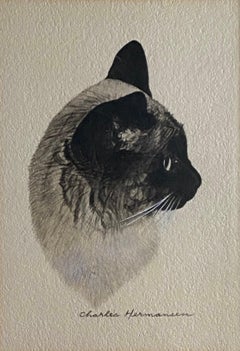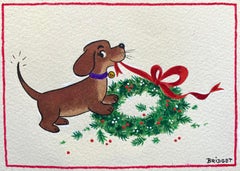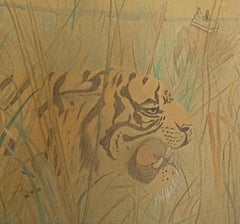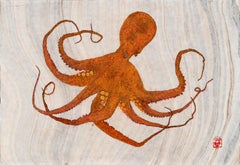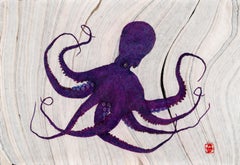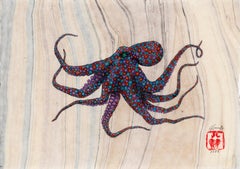Items Similar to “The Bird”
Want more images or videos?
Request additional images or videos from the seller
1 of 5
Nahum Tschacbasov“The Bird”1961
1961
About the Item
Post Modern experimental artwork of watercolor on handmade paper by the well known Russian/American artist, Nahum Tschacbasov. Signed lower left and dated 1961. Condition is very good. Provenance: Estate of the artist, Nahum Tschacbasov. Framed floating on cream mat board in a contemporary decorative frame. Overall measurements are 14.25 by 14.25 inches.
Russian-American artist Nahum Tschacbasov (1899-1984) is known for his cubo-surrealistic works which feature a strong psychological element. Some of his work bears a resemblance to work of another Russian-American artist--David Burliuk. He was somewhat of a late starter, moving to Paris in 1932 to study under Adolph Gottlieb, Marcel Gromaire and Fernand Leger. He had his first exhibition in Paris in 1934. He then returned to the US where he joined Rothko and Gottlieb at the Galery Seccession. He was one of the co-founders of The Ten, a group of social conscious abstract painters which included Rothko, Gottlieb, Joseph Solman and Ilya Bolotowsky, among others.
In 1944, he began to work at Stanley Hayter's Atelier 17, a center for surrealistic ideas. Between 1936 and 1943, he had five one-man exhibitions at the ACA Galleries and participated in five group shows. He also exhibited at the Whitney, the Pennsylvania Academy of Fine Arts, the Knox Albright Museum, the Chicago Institute of Fine Art and Corcoran, among others. His work can be found in the permanent collections of the Met, the Whitney, the Brooklyn Museum and the Jewish Museum.
Tschacbasov has been the subject of two recent retrospective at Fletcher Gallery, Woodstock, NY and in my own gallery, Arthur T. Kalaher Fine Art in Southampton, NY. He was also the subject of a retrospective at the National Arts Club entitled: "Nahum Tschacbasov: A Retrospective" in 2013.
- Creator:Nahum Tschacbasov (1899-1984, American)
- Creation Year:1961
- Dimensions:Height: 9.25 in (23.5 cm)Width: 9.75 in (24.77 cm)Depth: 0.1 in (2.54 mm)
- Medium:
- Movement & Style:
- Period:
- Condition:
- Gallery Location:Southampton, NY
- Reference Number:1stDibs: LU1417292912
About the Seller
5.0
Platinum Seller
Premium sellers with a 4.7+ rating and 24-hour response times
Established in 1977
1stDibs seller since 2013
522 sales on 1stDibs
Typical response time: 1 hour
- ShippingRetrieving quote...Shipping from: Sarasota, FL
- Return Policy
Authenticity Guarantee
In the unlikely event there’s an issue with an item’s authenticity, contact us within 1 year for a full refund. DetailsMoney-Back Guarantee
If your item is not as described, is damaged in transit, or does not arrive, contact us within 7 days for a full refund. Details24-Hour Cancellation
You have a 24-hour grace period in which to reconsider your purchase, with no questions asked.Vetted Professional Sellers
Our world-class sellers must adhere to strict standards for service and quality, maintaining the integrity of our listings.Price-Match Guarantee
If you find that a seller listed the same item for a lower price elsewhere, we’ll match it.Trusted Global Delivery
Our best-in-class carrier network provides specialized shipping options worldwide, including custom delivery.More From This Seller
View All“The Crow”
Located in Southampton, NY
Original gouache and watercolor on brown archival paper of a standing crow in profile. Signed and dated lower right. Condition is good to very good. Colors of the bird are strong a...
Category
1920s Modern Drawings and Watercolor Paintings
Materials
Gouache, Archival Paper, Graphite
$1,760 Sale Price
20% Off
“Cat in Profile”
Located in Southampton, NY
Exquisitely done profile of a cat done with graphite, watercolor and brushed wash by the Norwegian born artist, Charles Hermansen. Signed lower middle. Circa 1940. Condition is very...
Category
1940s Realist Animal Drawings and Watercolors
Materials
Watercolor, Archival Paper, Graphite
$750 Sale Price
37% Off
“Puppy with Christmas Wreath”
Located in Southampton, NY
Original artwork illustration composed of watercolor on archival paper by Bridget used as a Christmas card by the Fravessi Card Company in 1976. Signed Bridget lower right. Conditio...
Category
1970s Other Art Style Animal Drawings and Watercolors
Materials
Watercolor, Archival Paper
$275 Sale Price
31% Off
“Tiger”
Located in Southampton, NY
Original colored pencil on archival paper of a tiger in a jungle setting attributed to H.A. Wilson. No visible signature. Not examined out of frame. No current information on the art...
Category
1980s Contemporary Animal Drawings and Watercolors
Materials
Archival Paper, Color Pencil
$300 Sale Price
20% Off
“Shore Sentry”
By Syd Solomon
Located in Southampton, NY
Shore Sentry, is an original color, limited edition lithograph on handmade German black etching paper; printed by Topaz Editions in 1977. Artist proofs 10. Edition size 100. Provenance:: A Sarasota, Florida collector
Signed: Artist signed lower left with edition size
Image size: 22 by 30 inches
Sheet size: 30 by 38 inches
Edition 38/100
Condition: Excellent
Overall framed size: 30.25 by 38.25 inches
Framed under plexiglass in chrome colored metal gallery frame
SYD SOLOMON BIOGRAPHY
Written by Dr. Lisa Peters/Berry Campbell Gallery
“Here, in simple English, is what Syd Solomon does: He meditates. He connects his hand and paintbrush to the deeper, quieter, more mysterious parts of his mind- and he paints pictures of what he sees and feels down there.”
--Kurt Vonnegut Jr. from Palm Sunday, 1981
Syd Solomon was born near Uniontown, Pennsylvania, in 1917. He began painting in high school in Wilkes-Barre, where he was also a star football player. After high school, he worked in advertising and took classes at the Art Institute of Chicago. Before the attack on Pearl Harbor, he joined the war effort and was assigned to the First Camouflage Battalion, the 924th Engineer Aviation Regiment of the US Army. He used his artistic skills to create camouflage instruction manuals utilized throughout the Army. He married Ann Francine Cohen in late 1941. Soon thereafter, in early 1942, the couple moved to Fort Ord in California where he was sent to camouflage the coast to protect it from possible aerial bombings. Sent overseas in 1943, Solomon did aerial reconnaissance over Holland. Solomon was sent to Normandy early in the invasion where his camouflage designs provided protective concealment for the transport of supplies for men who had broken through the enemy line. Solomon was considered one of the best camoufleurs in the Army, receiving among other commendations, five bronze stars. Solomon often remarked that his camouflage experience during World War II influenced his ideas about abstract art. At the end of the War, he attended the École des Beaux-Arts in Paris.
Because Solomon suffered frostbite during the Battle of the Bulge, he could not live in cold climates, so he and Annie chose to settle in Sarasota, Florida, after the War. Sarasota was home to the John and Mable Ringling Museum of Art, and soon Solomon became friends with Arthur Everett “Chick” Austin, Jr., the museum’s first Director. In the late 1940s, Solomon experimented with new synthetic media, the precursors to acrylic paints provided to him by chemist Guy Pascal, who was developing them. Victor D’Amico, the first Director of Education for the Museum of Modern Art, recognized Solomon as the first artist to use acrylic paint. His early experimentation with this medium as well as other media put him at the forefront of technical innovations in his generation. He was also one of the first artists to use aerosol sprays and combined them with resists, an innovation influenced by his camouflage experience.
Solomon’s work began to be acknowledged nationally in 1952. He was included in American Watercolors, Drawings and Prints at the Metropolitan Museum of Art, New York. From 1952–1962, Solomon’s work was discovered by the cognoscenti of the art world, including the Museum of Modern Art Curators, Dorothy C. Miller and Peter Selz, and the Whitney Museum of American Art’s Director, John I. H. Baur. He had his first solo show in New York at the Associated American Artists Gallery in 1955 with “Chick” Austin, Jr. writing the essay for the exhibition. In the summer of 1955, the Solomons visited East Hampton, New York, for the first time at the invitation of fellow artist David Budd. There, Solomon met and befriended many of the artists of the New York School, including Jackson Pollock, Franz Kline, Willem de Kooning, James Brooks, Alfonso Ossorio, and Conrad Marca-Relli. By 1959, and for the next thirty-five years, the Solomons split the year between Sarasota (in the winter and spring) and the Hamptons (in the summer and fall).
In 1959, Solomon began showing regularly in New York City at the Saidenberg Gallery with collector Joseph Hirshhorn buying three paintings from Solomon’s first show. At the same time, his works entered the collections of the Whitney Museum of American Art, the Solomon R. Guggenheim Museum, and the Wadsworth Athenaeum in Hartford, Connecticut, among others. Solomon also began showing at Signa Gallery in East Hampton and at the James David Gallery in Miami run by the renowned art dealer, Dorothy Blau.
In 1961, the Guggenheim Museum’s H. H. Arnason bestowed to him the Silvermine Award at the 13th New England Annual. Additionally, Thomas Hess of ARTnews magazine chose Solomon as one of the ten outstanding painters of the year. At the suggestion of Alfred H. Barr, Jr., the Museum of Modern Art’s Director, the John and Mable Ringling Museum in Sarasota began its contemporary collection by purchasing Solomon’s painting, Silent World, 1961.
Solomon became influential in the Hamptons and in Florida during the 1960s. In late 1964, he created the Institute of Fine Art at the New College in Sarasota. He is credited with bringing many nationally known artists to Florida to teach, including Larry Rivers, Philip Guston, James Brooks, and Conrad Marca-Relli. Later Jimmy Ernst, John Chamberlain, James Rosenquist, and Robert Rauschenberg settled near Solomon in Florida. In East Hampton, the Solomon home was the epicenter of artists and writers who spent time in the Hamptons, including Alfred Leslie, Jim Dine, Ibram Lassaw, Saul Bellow...
Category
1970s Post-Modern Abstract Prints
Materials
Handmade Paper, Lithograph
“Cactus, Pyramid, and Rainbow”
Located in Southampton, NY
Very well executed original oil pastel on archival paper by the American artist, Tom Rickers. San Francisco school. Abstract with Signed and dated lower right 1977. Condition is ex...
Category
1970s Post-Modern Landscape Drawings and Watercolors
Materials
Watercolor, Gouache, Archival Paper
$1,280 Sale Price
20% Off
You May Also Like
Orange Crush - Gyotaku Style Japanese Sumi Ink Painting, Large Orange Octopus
By Jeff Conroy
Located in Chicago, IL
A Gyo-Tako print of large octopus is seen here in Jeff Conroy's work entitled "Orange Crush". To achieve this remarkable painting, the artist inks the octopus using traditional sum...
Category
21st Century and Contemporary Contemporary Animal Drawings and Watercolors
Materials
Watercolor, Sumi Ink, Mulberry Paper
Grape of Wrath - Gyotaku Style Japanese Sumi Ink Painting, Large Purple Octopus
By Jeff Conroy
Located in Chicago, IL
A Gyo-Tako print of large octopus is seen here in Jeff Conroy's work entitled "Grapes of Wrath". To achieve this remarkable painting, the artist inks...
Category
21st Century and Contemporary Contemporary Animal Drawings and Watercolors
Materials
Watercolor, Sumi Ink, Mulberry Paper
Dippin' Dotopus - Gyotaku Style Sumi Ink Painting of a Multi-Colored Octopus
By Jeff Conroy
Located in Chicago, IL
A small octopus is inked in the Japanese style of Gyo-Taku print making. Using sumi ink to "print" the octopus, the artist then embellishes it with colored pencil to convey an extra...
Category
21st Century and Contemporary Contemporary Animal Drawings and Watercolors
Materials
Sumi Ink, Watercolor, Mulberry Paper, Color Pencil
The Blue Ring of Cape Fourcroy - Gyotaku Painting of Octopus on Nautical Chart
By Jeff Conroy
Located in Chicago, IL
An octopus is inked in the Japanese style of Gyo-Taku print making. Using sumi ink to "print" the octopus, the artist then embellishes it with colored pencil to convey an extraordin...
Category
21st Century and Contemporary Contemporary Animal Drawings and Watercolors
Materials
Sumi Ink, Watercolor, Mulberry Paper, Color Pencil
Goldilocks, Pastel - Gyotaku Style Sumi Ink Painting of an Octopus
By Jeff Conroy
Located in Chicago, IL
A small octopus is inked in the Japanese style of Gyotaku print making. Using sumi ink to "print" the octopus, the artist then embellishes it with colored pe...
Category
21st Century and Contemporary Contemporary Animal Drawings and Watercolors
Materials
Sumi Ink, Watercolor, Mulberry Paper, Color Pencil
Sea Fan - Blue Meets Red - Gyotaku Style Sumi Ink Painting of an Octopus
By Jeff Conroy
Located in Chicago, IL
A small octopus is inked in the Japanese style of Gyo-Taku print making. Using sumi ink to "print" the octopus, the artist then embellishes it with colored pencil to convey an extra...
Category
21st Century and Contemporary Contemporary Animal Drawings and Watercolors
Materials
Sumi Ink, Watercolor, Mulberry Paper, Color Pencil
